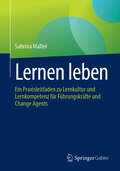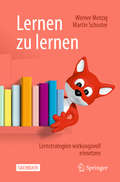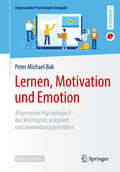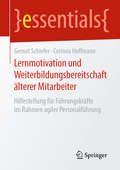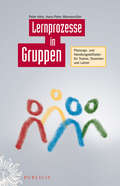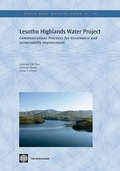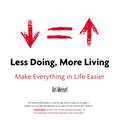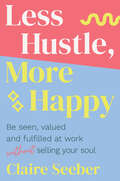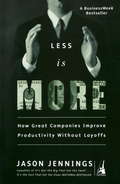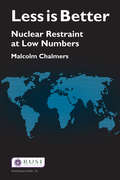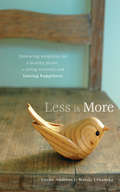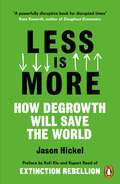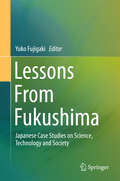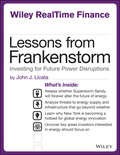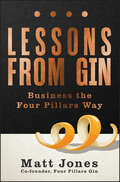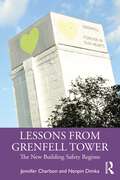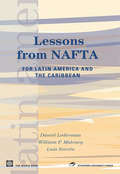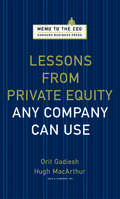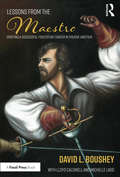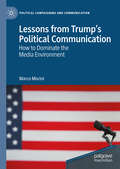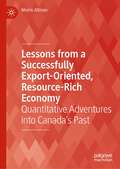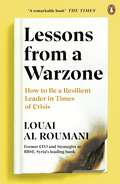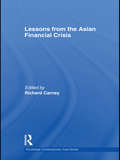- Table View
- List View
Lernen leben: Ein Praxisleitfaden zu Lernkultur und Lernkompetenz für Führungskräfte und Change Agents
by Sabrina MalterWie gestalte ich als Führungskraft eine Kultur der Lernbegeisterung und Veränderungsbereitschaft in meinem Team? Wie baue ich bei meinen Mitarbeitenden die dafür erforderlichen Fähigkeiten auf? Und wie gestalte ich eine Lernkultur im gesamten Bereich oder Unternehmen? Dieses Fachbuch gibt Antworten auf diese Fragen und leitet Führungskräfte und Change Agents an, aktiv eine Kultur des kontinuierlichen Lernens und des konstruktiven Umgangs mit Veränderungen zu gestalten. Führungskräfte sind dadurch in der Lage, mit ihrem Team auch in unsicheren Zeiten ambitionierte Ziele zu erreichen, Probleme zu lösen und so einen starken Beitrag zum Unternehmenserfolg zu leisten. Die Modelle und Methoden sind praxisnah aufbereitet, die Autorin gibt wichtige Hinweise zu möglichen Stolperfallen und Reflexionsfragen helfen bei der direkten Umsetzung. Auf der Webseite zum Buch können ergänzende Materialien wie Workshop-Designs und Checklisten heruntergeladen werden. Interviews aus erfolgreichen Unternehmen geben wertvolle Inspirationen aus der Praxis. Der Inhalt Fördere eine Haltung des Lernens und gestalte eine Lernkultur Denk- und Handlungsmuster des Lernens & praktische Lernkompetenz Reflexion ist der Anfang – der RIPU-Lernzyklus Denken wie ein Forscher – die Lern- und Coaching-Kata So gelingt Veränderung – Veränderungskompetenz durch Lernkompetenz Impulse aus der Praxis
Lernen zu lernen: Lernstrategien wirkungsvoll einsetzen
by Werner Metzig Martin SchusterWer wirkungsvoll lernen will, findet in diesem Buch die richtige Lernmethode für seinen Lernstoff. Jede Lerntechnik wird so beschrieben, dass man sie direkt anwenden kann. Ihre Wirkungsweise wird auf dem Hintergrund der Gedächtnispsychologie erklärt und ihre Wirksamkeit anhand von wissenschaftlichen Studien bewertet. Hinweise zur erfolgreichen Prüfungsvorbereitung sind ebenso enthalten wie Hilfen zum Umgang mit der Angst vor Misserfolgen und mit Lernblockaden.Die vorliegende 10. Auflage ist aktualisiert und enthält ein neues Kapitel zum "Lernen im Alltag".Die AutorenWerner Metzig und Martin Schuster sind Psychologen, die bis zu ihrer Pensionierung als Akademischer Rat bzw. Professor an der Universität zu Köln tätig waren.Stimmen zum Buch:Metzig und Schuster ... geben einen umfassenden und aktuellen Überblick über die Befunde der Lern- und Gedächtnispsychologie, beschreiben effektive Lerntechniken und zeigen mit Alltags-Beispielen ihre praktische Relevanz. ekz-Informationsdienst 3/2010Außerdem gibt das sehr flüssig geschriebene und gut zu lesende Buch viele nützliche Tipps, wie man das Lernen organisiert und Prüfungsangst und Lernblockaden überwindet. ... Ein Buch, das man sich möglichst schon im ersten Semester zulegen sollte. Studium 86/2010Effektive Lerntechniken werden mit Hilfe von Alltags-Beispielen plausibel erläutert und neue Informationen zur Lernmotivation machen das Buch zu einer echten Hilfe für Schüler und Studenten. lehrbibliothek.de 2/2011
Lernen, Motivation und Emotion: Allgemeine Psychologie II – das Wichtigste, prägnant und anwendungsorientiert (Angewandte Psychologie Kompakt)
by Peter Michael BakDieses prägnante Lehrbuch enthält die wichtigsten psychologischen Theorien und Konzepte aus den Bereichen Lernen, Motivation und Emotion. Es ist speziell für Studierende konzipiert, die sich einen starken Praxisbezug wünschen. Die sorgfältige Didaktik, Klausurfragen, digitale Zusatzmaterialien und Zusammenfassungen stellen eine optimale Grundlage für das Verstehen des Lehrstoffes und die Prüfungsvorbereitung im Bereich der Allgemeinen Psychologie II dar. Durch zahlreiche Anwendungsbeispiele, eingebundene Audioclips und Online-Zusatzmaterialien ist es in einzigartiger Weise anwendungsorientiert und weckt dadurch Lust, das Gelernte gedanklich weiterzuentwickeln und in verschiedensten Kontexten umzusetzen.
Lernmotivation und Weiterbildungsbereitschaft älterer Mitarbeiter: Hilfestellung für Führungskräfte im Rahmen agiler Personalführung (essentials)
by Gernot Schiefer Corinna HoffmannDie Lernmotivation älterer Mitarbeiter ist ein komplexes psychologisches Konstrukt, das bisher kaum thematisiert wurde. In Zeiten des demografischen Wandels ist es von zentraler Bedeutung, ältere Arbeitnehmer zur stetigen Weiterbildung zu motivieren, um sie beschäftigungsfähig zu erhalten. Mit zunehmendem Alter zeigen sich Veränderungen der Lern- und Leistungsfähigkeit sowie eine sinkende Motivation für berufliche Weiterbildung. Gernot Schiefer und Corinna Hoffmann zeigen Zusammenhänge zwischen Motivation, Leistung und Lernverhalten auf und analysieren Motivationsfaktoren und Lernhindernisse älterer Arbeitnehmer. Praxisnah stellen die Autoren Möglichkeiten für Unternehmen vor, wie diese zur Förderung der Lernmotivation ihrer älteren Arbeitnehmer aktiv beitragen können.Die Autoren:Prof. Dr. Gernot Schiefer lehrt Wirtschaftspsychologie und Personalmanagement an der FOM Hochschule in Mannheim und arbeitet als Coach und Berater.Corinna Hoffmann, M. Sc. arbeitet im Bereich Human Resources eines internationalen Konsumgüterherstellers.
Lernprozesse in Gruppen: Planungs- und Handlungsleitfaden für Trainer, Dozenten und Lehrer
by Peter Kehr Hans-Peter Wannemüller"Lernprozesse in Gruppen" ist die Antwort auf die Frage: "Gibt es irgendein Buch, das all die Aspekte der Planung und Durchführung von Unterrichten konkret und anschaulich darstellt?" Leser/innen bekommen damit Anregungen und Handlungsideen, mit denen sie - ohne die Eigenschaften des einzelnen Menschen als Lernendem außer Acht zu lassen - Lernprozesse in Gruppen zielorientiert und nachhaltig planen und durchführen können, von der Anfangssituation bis hin zum Abschluss. Das Buch gibt praktische Hinweise zur effektiven Gestaltung von Lernprozessen. Es vermittelt Trainern, Dozenten und Lehrern die nötige Rollenflexibilität und die konkrete Vorstellung davon, wie sie situationsorientiert handeln können. Und es zeigt, wie Pädagogik, Didaktik und Kommunikation sinnvoll verknüpft werden, um Trainings, Seminare, Unterrichte und Kurse zielgerichtet zu planen und lebendig durchzuführen. Mit diesem Buch können die Leser/innen die Qualität ihrer Unterrichte und Seminare überprüfen, sie professioneller planen und durchführen und mehr Sicherheit im täglichen Handeln erreichen. Mit hohem Praxisnutzen behandelt es die Fragen: - Mit welchen Verhaltensweisen schaffe und fördere ich die Arbeitsatmosphäre und den Lernprozess der Gruppe und der einzelnen Teilnehmer? - Wie plane und gestalte ich Lernprozesse zielgerichtet, lebendig und teilnehmerorientiert? - Welche Impulse setze ich? Wie reagiere ich auf Störungen? Das Buch richtet sich an Trainer, Dozenten, Lehrer, Bildungsreferenten, Personalentwickler und Bildungseinrichtungen.
Leslie Brinkman at Versutia Capital
by Robert Steven Kaplan Julie BattilanaLeslie Brinkman is the founder and CEO of a hedge fund, Versutia Capital. Leslie spent late 2002 and early 2003 assembling her team and launched the fund in early 2003. While the firm performed well during 2003 and 2004 (both in terms of returns and new assets), in 2005 the results began to suffer. Describes the process of designing the firm, the resulting team dynamics, the strains on the staff and the impact of Leslie's management style on the performance of her team. In the spring of 2005, Leslie must decide whether to re-design the firm and/or change her management style in order to address the performance issues that Versutia Capital is facing.
Lesotho Highlands Water Project: Communication Practices for Governance and Sustainability Improvement
by Leonardo Mazzei Lawrence J. M. Haas Donal O'LearyThis paper considers the multi-faceted lessons of the Lesotho Highlands Water Project and how the project can serve as a model of mutually beneficial development, though demonstrating the benefits of a bilateral governmental cooperative approach in the development of an international river. These benefits include exceeding the impact of individual national approaches and strengthening political cooperation among all participants. This model is particularly relevant since approximately 40 percent of the world's population lives in transboundary river basins and more than 90 percent of the world's population lives within countries that share these basins.
Less Doing, More Living
by Ari Meisel"Less is more"--or, more specifically, the less you have to do, the more life you have to live. Efficiency expert Ari Meisel details his "Less Doing" philosophy, which will streamline your life, and make everything easier. In business and our personal lives, it often seems as if the only way to get more done is by putting in more time--more hours at the office, more days running errands. But what if there were a way that we could do less, and free up more time for the things and people we love? If this sounds like what you need, Ari Meisel--TEDx speaker, efficiency consultant, and achievement architect--has the program for you. In Less Doing, More Living, Meisel explores the fundamental principles of his "Less Doing" philosophy, educating the reader on: Optimizing workflow with twenty-first-century apps and tools Creating an "external brain" in the Cloud to do all of your "lower" thinking--like keeping track of appointments, meetings, and ideas How to use technology to live a paper-free life The three fundamentals of wellness--fitness, sleep, and nutrition--and technological approaches to improving these areas of life And so much more! This book will give readers new tools and techniques for streamlining their workload, being more efficient in their day-to-day activities, and making everything in life easier.
Less Hustle, More Happy: Be seen, valued and fulfilled at work without selling your soul
by Claire SeeberA disengagement epidemic is costing workplaces globally $8.8 trillion per year, with $218 billion of that in Australia. Employees are searching for answers on how to operate in the post-COVID working world in a way that feels right for them. They don' t need more information; they need practical direction on how to apply their knowledge in skills that are relevant. They need it shared in a way that doesn' t feel as if their mum is telling them what to do but, instead, as if a friend is brainstorming with them in a way that makes them feel heard, seen, valued and understood. Less Hustle, More Happy is packed with real insights, practical strategies, accessible tools, and a solid punch of laugh-out-loud moments where Claire Seeber shares some of her own career ‘ facepalm' stories. She distils her knowledge into a comprehensive blueprint that addresses the evolving challenges of today's professional landscape in a way that feels liberating, not stifling. This book is for ambitious individuals who know there must be more to a successful career than just working harder. It is a ‘ how to' guide to get you heard, seen, noticed and valued in your workplace without selling your soul!
Less Is More
by Jason JenningsIn an age when every business needs to achieve more with fewer resources, Jason Jennings offers the key to ramping up productivity. In this BusinessWeek bestseller, he identifies the world’s most productive companies and reveals their secrets—none of which, surprisingly, include layoffs. The companies he features are truly astonishing, from Ryanair, which generates three times more profit per employee than the legendary Southwest Airlines, to Nucor, a steel firm with annual growth of seventeen percent for the past thirty-one years and the highest paid workers in the industry. Drawing on these and other amazing companies, Jennings presents his readers with solid advice on how to streamline businesses, eliminate waste, and inspire greatness within a workforce. .
Less is Better: Nuclear Restraint at Low Numbers (Whitehall Papers)
by Malcolm ChalmersDespite the rise of ‘new’ security threats like terrorism, cyber-war and piracy, the terrible destructive power of nuclear weapons still hangs over the world. Discussion on further strategic nuclear arms reduction has tended to be dominated by the analysis of possible trade-offs between the US and Russia. But as the prospect of further cuts below ‘New START’ levels is contemplated, increasing attention needs to be paid to the possible shape of a new, multi-power approach to nuclear restraint. While restraint at low numbers goes with the grain of thinking in most nuclear states, correct sequencing will be vital. Using the New START framework, attention could initially be focused on incremental decreases in US and Russian stocks of the most dangerous weapons. Thereafter, the other nuclear powers would need to take steps to limit the size and capabilities of their own arsenals in a process of mutual reductions. If successful, the benefits would be wide ranging: successful restraint amongst existing nuclear-armed states could engender trust, as well as provide mechanisms for reducing the risks of rapid escalation in the event of limited conflict. Less is Better considers the various challenges and opportunities for ensuring restraint at low numbers in today’s complicated web of bilateral nuclear relationships and in the context of the debate on ‘Global Zero’.
Less is More
by Cecile Andrews Wanda Urbanska"it is a series of hard-hitting essays by a diverse collection of writers that wraps its arms around everything from simplicity to climate change to economic metrics to happiness. I approached each chapter (each new writer) with skepticism and a willingness to put the book down, and I found my self delighted time after time. This is a book anyone would be glad to have on their shlf." - Lyle Estill "Here is a book with its roots in the earth that can move you to new places, stimulate ideas and encourage change. Less is More will show you how to divest gradually, to live more in the present moment, while still paying attention to technology, health, politics and the environment. Simplicity is not a turning away. It is a rejoining." Barbara Bamberger Scott "The anthology's true strength comes in the diversity of its voices - which include not only journalists and activists, but also businesspeople and ministers. Less is More will serve as an informative and inspiring primer." - Ryan Williams, ForeWord Magazine "Andrews and Urbanska are masterful in their prose and their ability to bring together an eclectic array of writers, thinkers and sustainability adovcates who live in ways that echo what they write about. " John Ivanko "No good idea stays local for long," writes Jay Walljaspsr in Less is More, a smart collection of essays that chant the simplicity mantra without oversimpifying the issues at stake. Many of these ideas seem bound to travel far." - Utne Reader "I am both educated and inspired by the writings in Less is More. Living simply, like finding the heart, is the work of a lifetime. It is not easy to get there, but it provides a life of ease once the goal is reached. This book is a wonderful contribution to reorienting our lives away from the alienating influences of our shame-inducing consumer culture back toward what is really important: the choice to care for ourselves, others and the planet in a simple, loving way." - Glenn Berger, PhD, glennbergerblog People are afraid and anxious. We're destroying the planet, undermining happiness, and clinging to an unsustainable economy. Our obsessive pursuit of wealth isn't working. But there's another way. Less can be More. Throughout history wise people have argued that we need to live more simply--that only by limiting outer wealth can we have inner wealth. Less is More is a compelling collection of essays by people who have been writing about simplicity for decades. They bring us a new vision of Less: less stuff, less work, less stress, less debt. A life with Less becomes a life of More: more time, more satisfaction, more balance, and more security. When we have too much, we savor nothing. When we choose less, we regain our life and can think and feel deeply. Ultimately, a life of less connects us with one true source of happiness: being part of a caring community. Less is More shows how to turn individual change into a movement that leads to policy changes in government and corporate behavior, work hours, the wealth gap, and sustainability. It will appeal to those who want to take back their lives, their planet, and their well-being.
Less is More: How Degrowth Will Save the World
by Jason Hickel'A powerfully disruptive book for disrupted times ... If you're looking for transformative ideas, this book is for you.' KATE RAWORTH, economist and author of Doughnut EconomicsA Financial Times Book of the Year______________________________________Our planet is in trouble. But how can we reverse the current crisis and create a sustainable future? The answer is: DEGROWTH.Less is More is the wake-up call we need. By shining a light on ecological breakdown and the system that's causing it, Hickel shows how we can bring our economy back into balance with the living world and build a thriving society for all. This is our chance to change course, but we must act now.______________________________________'A masterpiece... Less is More covers centuries and continents, spans academic disciplines, and connects contemporary and ancient events in a way which cannot be put down until it's finished.' DANNY DORLING, Professor of Geography, University of Oxford'Jason is able to personalise the global and swarm the mind in the way that insects used to in abundance but soon shan't unless we are able to heed his beautifully rendered warning.' RUSSELL BRAND'Jason Hickel shows that recovering the commons and decolonizing nature, cultures, and humanity are necessary conditions for hope of a common future in our common home.' VANDANA SHIVA, author of Making Peace With the Earth'This is a book we have all been waiting for. Jason Hickel dispels ecomodernist fantasies of "green growth". Only degrowth can avoid climate breakdown. The facts are indisputable and they are in this book.' GIORGIS KALLIS, author of Degrowth'Capitalism has robbed us of our ability to even imagine something different; Less is More gives us the ability to not only dream of another world, but also the tools by which we can make that vision real.' ASAD REHMAN, director of War on Want'One of the most important books I have read ... does something extremely rare: it outlines a clear path to a sustainable future for all.' RAOUL MARTINEZ, author of Creating Freedom'Jason Hickel takes us on a profound journey through the last 500 years of capitalism and into the current crisis of ecological collapse. Less is More is required reading for anyone interested in what it means to live in the Anthropocene, and what we can do about it.' ALNOOR LADHA, co-founder of The Rules'Excellent analysis...This book explores not only the systemic flaws but the deeply cultural beliefs that need to be uprooted and replaced.' ADELE WALTON
Lessons From Fukushima
by Yuko FujigakiThis book is about the consequences of the Fukushima disaster in light of their technological, societal, political, cultural and environmental origins. The magnitude of the nuclear accident is investigated in this book in the contexts of politics, economy, and society. The authors scrutinize the relationships between science, technology and society leading to this accident. Further, the authors reveal how these relationships were constructed historically. This book provides a case analysis on the Fukushima disaster in political, societal, economic and cultural dimensions. In addition, analyses for historically grown relationships between different societal spheres mouthing into disasters are presented using examples of the Minamata disease (Mercury pollution), Itai-Itai Disease (Cadmium pollution), BSE, and GMOs. With this book, Yuko Fujigaki achieves to connect local and cultural peculiarities with generalized scientific information and practices in a coherent, logical fashion to a comprehensive volume on a very actual topic of global significance. In light of a globally increasing energy gap, this book has a distinct global relevance, providing an honest account on different triggers mouthing into the nuclear disaster. This book not only gives a scientific account. It also can also contribute to prevent future disasters starting from similar vectors.
Lessons for Tomorrow's Leaders: Leading Sustainable and Scalable Change
by John Elkington Pamela Hartigan Janice H. HammondIt takes courage to attempt the apparently impossible, but great innovators and entrepreneurs have embraced such challenges. In this chapter, the authors offer some guidance on what others can do to help support the work of social and environmental entrepreneurs and other change makers and provide some important takeaways for tomorrow's leaders.
Lessons from Frankenstorm: Investing for Future Power Disruptions (Wiley RealTime Finance)
by John LicataThe world has been brought to its knees in recent years due to an increased amount of hurricanes, tsunamis and earthquakes which collectively have left tens of millions without power and derailed economic growth in the process. However, today weather is not the only threat to massive power loss. It’s time to fight back before energy weaknesses and instabilities from disruptive weather patterns cause financial chaos around the world through cyberwarfare. In Lessons from Frankenstorm, you'll learn how to fight back. Overview: A look back at recent events (Fukushima, India blackout, Sandy here in the U.S., August 2003 blackout in Northeast U.S., etc.). Set up the case that something needs to be done, especially with warming temperatures (2012 was the hottest year on record). What are threats? Focus here is on weather (temperatures, rising tides, global warming, dwindling water supplies which impact certain energy sources (i.e. fracking, biofuels), terrorism (cyberterror which may create a whole new investing sector in the very near future). What can governments and utilities do? It could be good to focus on disaster recovery efforts, crisis management, legislation, planning and strategy AHEAD of next major storm or terrorist threats that could rattle global financial marketplaces. New legislation could lead to new asset allocation by investors, technology companies, utilities and private equity. Legislation (i.e. endorsing modern nuclear power, offshore wind, etc.) may also cause new alliances, joint ventures as a result. Could Frankenstorm be used a global blueprint for energy innovation? Here focus on efforts seen in New York and New Jersey emerging from the darkness and ruin left by Superstorm Sandy through the real next generation energy technologies and themes that investors may want to focus on for the next decade (i.e. thorium nuclear reactors which China just announced they are moving toward—should the U.S. follow?). Complacency is not the answer. Doing nothing and simply waiting for another major power outage that not only challenges our credibility as a superpower in a new world economy but could also cripple global market centers (maybe look at how slow Japan has reacted to Fukushima while Germany moved way too fast in my view to move away from nuclear power—something that has caused surging electricity prices).
Lessons from Gin: Business the Four Pillars Way
by Matt JonesHow a global industry icon was created right here in Australia — with insights, stories and recipes from a co-founder of Four Pillars Gin How did a small business from a regional Aussie town get voted the world’s best gin producer THREE times? Four Pillars Gin, a craft distillery in Victoria’s Yarra Valley, today is not only an Australian favourite but a global powerhouse. Co-founder Matt Jones shares the secrets behind building a brand that started as a small cult favourite and has become a world-leading success. Including stories, recipes and business lessons from a decade of gin-soaked archives, Lessons from Gin has the ingredients you need to grow your own business and brand. Matt tells his side of the extraordinary Four Pillars story, sharing what he and the team learned in a decade that changed the distilling industry in Australia. Taking you on his journey as a creative brand strategist during the rise of social media, he reveals how Four Pillars became a benchmark for excellence and a beloved household name. You’ll discover how true innovators think creatively and strategically, with practical models for driving incredible growth in your own career and industry. In Lessons from Gin, you’ll learn how to: Place creativity at the heart of your business Design a brand that tells a story Craft the kind of product excellence that wins fans and followers Create experiences that engage and build a community of loyal believers Develop a culture and lead a team of passionate people through a shared purpose and vision Build a sustainable business anchored in genuine values and bold ambition Lessons from Gin gives Four Pillars fans real insight into how their favourite gin conquered the world. It is a must-read for entrepreneurs, business owners, marketers, and leaders in any industry who want to craft a brand that people love to want.
Lessons from Grenfell Tower: The New Building Safety Regime
by Jennifer Charlson Nenpin DimkaAs a consequence of the Grenfell Tower fire, a building safety revolution is underway for construction and property professionals. This book analyses prior significant building fires and explains the new building safety regime including the Building Safety Act 2022 and the Building Safety Regulator. The aim is to provide an explanation of the Building Safety Regime. To that end, coverage includes: The Grenfell Tower fire: the Hackitt Review and Public Inquiry Remediation of existing buildings Legal Framework: the Fire Safety Act 2021 and Building Safety Act 2022 Building Regulations: Part B Revisions and the Combustible Material Ban The Building Safety Regulator Guidance and Consultations Change has arrived for construction and property professionals in the wake of the Grenfell Tower fire. This book is for readers who have responsibilities in the Built Environment or Real Estate to take the first steps towards implementation and compliance with the new regime.
Lessons from NAFTA: For Latin America and the Caribbean
by Daniel Lederman Luis Serven William F. MaloneyAnalyzing the experience of Mexico under the North American Free Trade Agreement (NAFTA), Lessons from NAFTA aims to provide guidance to Latin American and Caribbean countries considering free trade agreements with the United States. The authors conclude that the treaty raised external trade and foreign investment inflows and had a modest effect on Mexico's average income per person. It is likely that the treaty also helped achieve a modest reduction in poverty and an improvement in job quality. This book will be of interest to scholars and policymakers interested in international trade and development.
Lessons from Private Equity Any Company Can Use
by Orit Gadiesh Hugh MacarthurPrivate equity firms are snapping up brand-name companies and assembling portfolios that make them immense global conglomerates. They're often able to maximize investor value far more successfully than traditional public companies. How do PE firms become such powerhouses? Learn how, in Lessons from Private Equity Any Company Can Use. Bain chairman Orit Gadiesh and partner Hugh MacArthur use the concise, actionable format of a memo to lay out the five disciplines that PE firms use to attain their edge:· Invest with a thesis using a specific, appropriate 3-5-year goal· Create a blueprint for change--a road map for initiatives that will generate the most value for your company within that time frame· Measure only what matters--such as cash, key market intelligence, and critical operating data· Hire, motivate, and retain hungry managers--people who think like owners· Make equity sweat--by making cash scarce, and forcing managers to redeploy underperforming capital in productive directionsThis is the PE formulate for unleashing a company's true potential.
Lessons from The Maestro: Crafting a Successful Fight/Stunt Career in Theatre and Film
by David L. BousheyIn Lessons from The Maestro: Crafting a Successful Fight/Stunt Career in Theatre and Film, famed Hollywood and theatre stuntman, trainer, and fight director David L. Boushey writes about his life, the history of stage and screen combat and stunt work, and how to enter the entertainment industry. Charting his illustrious career that spanned over 45 years, 400 theatre credits, and 45 films, Boushey narrates the events and decisions that lead him to enter the entertainment industry and documents for the first time his founding of multiple national and international associations for fight directors and stuntmen. He provides a roadmap for individuals aspiring to work in the theatre and film industry, providing information on training, auditioning, networking, unions, different paths one might take, and tips on how to be a successful stunt performer in a competitive industry. Part autobiography, part how-to guide to the entertainment business from the foremost authority in stage combat and stunt work, this is an invaluable resource for professional and aspiring fight and intimacy directors and stunt performers in theatre and film.
Lessons from Trump’s Political Communication: How to Dominate the Media Environment (Political Campaigning and Communication)
by Marco MoriniThis book explores Donald Trump’s political communication as a candidate and in the first two years in office. The 45th US President is dominating the media system and 'building the agenda' through the combined action of five strategies. He disintermediates his communication and manufactures a permanent campaign climate based on strong and inflammatory language to attract a constant and decisive media coverage. In disarticulating old-style political rhetoric, he privileges emotions over contents, slogans above thought. Trump’s jokes, mockeries and distinct rhetoric – showing similarities to rhetorical strategies of Nazis during the 1930s – help him impersonate the populist ‘everyday man’ who fights against the elites. His dominance of the news cycle also reflects a desire for higher TV ratings and Web traffic numbers. Essentially, Trump has critically exploited the media’s news logics and taken advantage of the American public's lack of trust in journalism.
Lessons from a Successfully Export-Oriented, Resource-Rich Economy: Quantitative Adventures into Canada’s Past
by Morris AltmanA major theme of this book is that, contrary to what many experts believe, being endowed with a plenitude of natural resources is not a curse: rather it provides a potential advantage, if capitalized by the well-endowed economy. Much depends on the institutions that help frame the decision-making process that affects the process of growth and development. Canada is an example of a successful export-oriented economy. And, its export-orientation has been a focal point of discussion and debate, going way back to discussions of the early fur trade, the fishing industry, wheat farming, and mining and oil and gas exploration. Unlike other economies well-endowed with natural resources, Canada does not appear to be at all cursed, but rather blessed with natural resource abundance. This book, which ranges from the late seventeenth to the early twentieth century, provides insights from Canadian economic history on how such abundance can be a handmaiden of successful growth and development. From this perspective, the natural resource curse appears to be more of a ‘man-made’ phenomenon than anything else. This book also investigates aspects of gender inequality in Canada as well as the evolution of hours worked as it intersects with worker preferences and ‘market forces’. The narratives in this book are contextualised by the construction of new or significantly revised data sets, which speaks to the importance of data construction to robust economic analysis and economic history.
Lessons from a Warzone: How to be a Resilient Leader in Times of Crisis
by Louai Al RoumaniOne day, everything is going well; the next, disaster strikes. What do you do when every pillar is collapsing, every rule is being broken and chaos seems to be all around you?'Pessimism be damned. This man steered his bank through four years of a hellish civil war - and the lessons he learnt will benefit us all.' Sathnam Sanghera, author of EmpireLand ________________ An inspiring story of resilient leadership in the toughest of times. Louai Al Roumani was head of finance and planning at one of the largest banks in Syria when the war broke out in 2011. In Lessons from a Warzone, Al Roumani shares his very personal account of coping with the day-to-day realities of leading an organization in dangerous and hostile conditions. His story shows how inspiration can come from the unlikeliest of places, and how a business can not only survive in chaos, but can learn to thrive - the bank became the undisputed sector leader as people's trust in its capability to protect their life-long savings strengthened. In this book, Al Roumani distils the knowledge and skills he and his colleagues developed while steering the bank through four impossible years into ten lessons applicable to any leader facing a crisis today. His valuable and often counterintuitive advice will help anyone understand how to be resilient even in the most challenging of times. ________________ 'A compelling guide for leaders grappling with the pandemic... the lessons in resilient leadership in turbulent times that Roumani offers are universal.' Pilita Clark, Financial Times'Contains powerful lessons about resilience that show how companies can come out of crises better and stronger if they focus on long-term opportunities, no matter how tough it gets in the short term' Ana Botín, executive chair, Banco Santander
Lessons from the Asian Financial Crisis (Routledge Contemporary Asia Series)
by Richard CarneyNearly ten years after the Asian Financial Crisis, financial turmoil has reappeared – this time it is ravaging the world's wealthiest countries and dragging the global economy along for the ride. It forces one to reflect on the last major financial crisis to afflict the global economy, and to consider whether there are any similarities, and whether there are any lessons from that crisis that we can apply to the current one. Written by a distinguished group of individuals from government, the private sector, international organizations, and academia, this book provides an overview of developments in the main affected countries during the Asian Financial Crisis, as well as the lessons learned and corrective measures taken at the country, regional, and international levels. Importantly, attention is also paid to the areas where substantial improvements are needed. The current crisis heightens the relevance of these lessons. Lessons from the Asian Financial Crisis will be invaluable to those studying international relations, international finance, international economics and East Asian studies.
